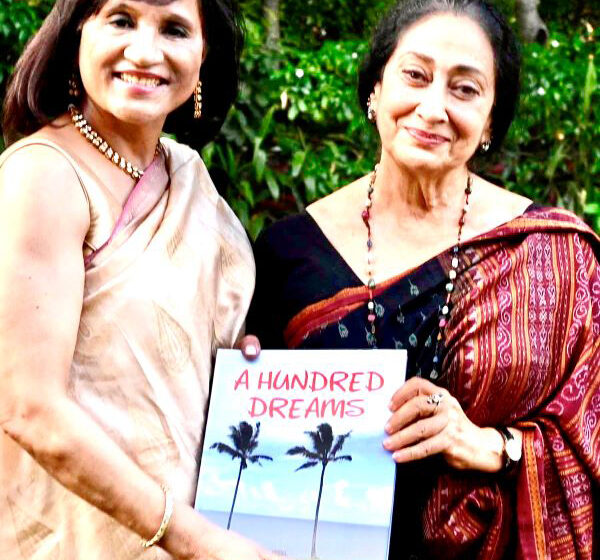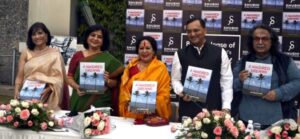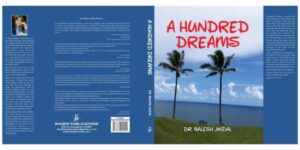A practicing doctor-cum-artist now comes out with a Coffee Table Book

Dr Balesh JIndal with renowned Odissi dancer Sharon Lowen at the launch of her book
Rajkumari Sharma Tankha
Literature and art always fascinated her. An avid reader since her early childhood, she contributed stories and poems in various publications. But her life path was chartered by her father who wanted her to become a doctor and serve rural areas where access to medicare was scarce.
So, rather than going the “arts” way, she joined the Lady Hardinge Medical College, and, for the last 38 years, has been treating the fifth generation of the families that “adopted” her as their “family doctor” nearly four decades back. But creative arts never left her. She indulged in it even during the busy days of her MBBS studies.
Meet Dr Balesh Jindal, a practicing doctor, a painter, a photographer and a writer, all rolled into one.
Dr Jindal recently came out with a coffee table book, A Hundred Dreams Plus, a book which showcases a wide range of photographs of benches from around the world that she clicked. Each pic comes with a poignant poem about relationships, about momentary regrets, joys, doubts and sadness that overwhelm all of us at some point in life.
In a free-wheeling interview, Dr Jindal tells us about her life, and more:
In your busy schedule of learning to become a doctor, how did creative arts fit in?
They just happened. I feel when the heart yearns for something; it finds its way to reach you. I have been painting for more than 30 years now and my works have been collected by discerning art collectors. I am fortunate to have met good galleries and connoisseurs who appreciated my art.
Being a doctor and a self-taught artist, I knew of no rules or boundaries. I developed and honed my skills of using the knife for refined art work. My works have redefined the way a knife can be used to create fine art. I do not put thick and rough textures which are associated with the palette knife. Using a kitchen knife, I created the signature faces that I am recognised for. I use almost a hundred strokes per inch to get the right textures. The paints roll directly from the tubes on to the canvas creating many happy accidents.
Being a self-taught artist gave me the freedom to practice my art without the fetters of techniques taught at art schools. Art and writing was never my livelihood so I was truly free to write and paint.
How did A Hundred Dreams happen?
I call myself an aesthete. A lover of beautiful things, deeds, words and thoughts. My love for photography, poetry and art are all facets of this desire for an aesthetic expression. It is also an expression of the people who I come across in my medical practice. I watch their faces and analyse them. I wonder about the dreams they found and lost on the way. I wonder what keeps them going in the face of hardships. What makes them smile, what makes them cry!!!
Benches fascinated me over the years because I felt that they were a place of one’s own. They were not home yet some became home, even if for a few moments. Accepting, forgiving and unquestioning, the benches were always there. Home to rest the weary soul, unburden it and then go one’s way. So I started photographing them more than a decade ago. The benches drew me to them like an old friend who I could not ignore.
The vision of the book was extremely abstract in the initial stages and later, I watched wondrously as random holiday pictures metamorphosed into this beautiful book, A Hundred Dreams.

What is the significance of the title, A Hundred Dreams?
It was during COVID that I realised that I had exactly one hundred pictures of benches and more than a hundred poems scribbled on bits of paper and pages of old diaries. I had been writing them along the years as I clicked the pictures of assorted benches. Hence, the feelings and thoughts I express are like scattered, little stars that dot the book with many situations and moods that I lived through in the last decade. They were written at leisure as I had no deadlines. The poems are slow dreams. The dreams that were lost, realised, compromised, betrayed. Dreams that gave hope, joy and strength to live on. I guess the idea of a Hundred Benches was always there at the back of my mind. The title seemed most natural as I sat to compile and refine the book. It was the only title that seemed appropriate.
How do you find time for these passions of yours?
As a doctor I have seen the world passing by, struggling, broken, resilient and incomplete. To observe humans so closely and live their lives as if they were my own, empathising with my patients gave me an insight that helped me as a writer, artist as well as a photographer. I cannot choose one and leave the other part of me for all these roles are intertwined. In my younger years I did hanker to become a writer. But today, I feel being a doctor has redefined my identity in a larger way and made me a better person. How can one be a good artist or a poet if one has not lived thousands of lives? I got the opportunity to live thousands of lives and experience agony and suffering first hand.
Who do you get your inspiration for art from? Who do you consider your ideal?
As I said before that my patients have defined my identity. I have learnt so much more from them. I set out to help poor patients but I felt that I received much more from them than I gave. I observed them as an artist would observe a model in her studio. I analysed them as a critic. Patients who walked into my clinic became my inspiration and my muse.
I observed that young girls were being abused by people familiar to them. Girls as young as three years were being abused by cousins, uncles, even fathers. I started visiting local schools to educate these girls. When I wrote about these experiences of mine, my essay was selected from entries around the world and awarded The Award for Compassion from Stanford University. Even today, this is the cause that moves me.
Of all the roles you play which one do you love the most?
All. In spite of having a full time practice, my heart lay in creating art and writing. So, I made it a rule to paint every morning for a few hours. Lack of time can never be a good enough excuse not to do something. One has to forgo something in life to pursue passions. For me television and telephone were never an important part of my life, which made things easier. Painting and writing in the mornings became/ and is a ritual for me.


